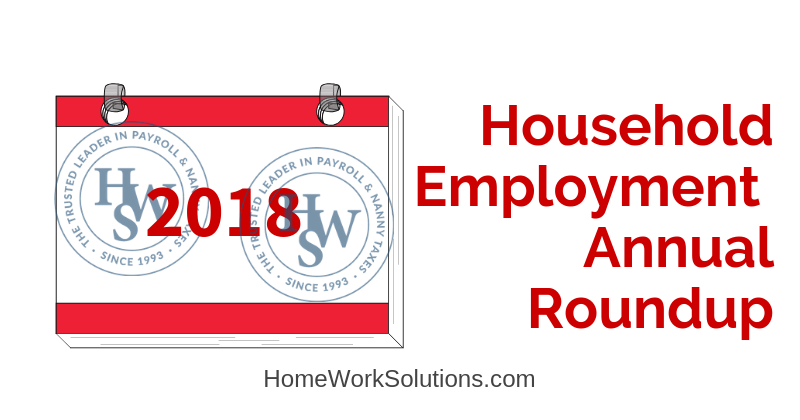 Every year HomeWork Solutions prepares a "what's new or changed" roundup of household employment tax laws and benefit information.
Every year HomeWork Solutions prepares a "what's new or changed" roundup of household employment tax laws and benefit information.
HOUSEHOLD EMPLOYEE 2019 WAGE BASE:
The IRS annually reviews, and adjusts as necessary, the wage payment threshold that obligates a family to pay Social Security and Medicare taxes and issue employees W-2 forms. This threshold remains at $2100 of wages in a year for 2019.
QUALIFIED SMALL EMPLOYER HEALTH REIMBURSEMENT ARRANGEMENTS:
The IRS allows an employer to reimburse healthcare costs to their employee tax free up to a limit. In 2019 those limits are $5,150 for a single plan and $10,450 for a family plan; these limits are prorated to monthly equivalents. Each employee will need to have an ACA compliant plan and the reimbursement is good for any qualified healthcare expense – premiums, co-pays, prescriptions, etc. The employer must have a written plan (we have you covered there) and all reimbursements must be noted on the W-2 form to remain tax free.
> Request a Free QSEHRA Plan Template
PAID SICK LEAVE LAWS:
Four states - California, New York, Rhode Island, and Washington —plus the District of Columbia have enacted laws prior to 2018 to provide job-protected PAID leave to workers to care for their newborns as well as sick and disabled family members. Many other states and localities have advanced regulations that offer PAID leave to employees of smaller employers (generally 10 or more employees) and UNPAID job-protected leave to employees of smaller employers. In general these laws allow time off to deal with both the employee’s illness and medical appointments and that of family members. Most laws require employees to make a reasonable effort to schedule paid leave so as not to unduly disrupt the operations of the employer – in other words notice of medical appointments should be ample and, when possible, be scheduled close to the beginning or end of the day.
Here is what is new for PAID SICK LEAVE in 2018:
- Washington requires all employees to accrue paid sick leave at 1 hour for every 40 hours worked. Employees can use the leave after the 90th day of employment. Unused leave of up to 40 hours must carry over to the next year.
- Effective October 29, 2018, New Jersey employees will accrue one hour of paid sick leave for every 30 hours worked, up to a maximum of 40 hours in one year. Employees may begin to use their paid leave beginning February 1, 2019.
- New York City has a citywide paid sick leave law effective May 5, 2018. Domestic workers earn two days of paid sick leave under City law. This sick leave is in addition to the three days of paid rest to which domestic workers are entitled under Section 161(1) of the New York State Labor Law.
- Arizona requires 24 hours of paid sick leave annually, accrued at one hour for every 30 hours worked up to 24 hours/year effective July 2, 2018.
- Michigan household employers will accrue 1 hour of paid sick leave for every 30 hours worked to a maximum of 40 hours a year effective January 2, 2019. Employees may take up to an additional 32 hours of unpaid sick leave without fear of employer retaliation.
2019 MILEAGE REIMBURSEMENT
The IRS adjusts the reimbursement rate for business related use of your automobile every year. 2019 sees a rate increase of 3.5 cents, up to a new mileage reimbursement of 58 cents per mile. Business use for a household employee may include running errands for the family and transporting children or a senior to appointments, activities and school. Routine commuting between your home and place of work is NOT considered business use, and is not typically reimbursed. If any commuting is reimbursed, this is considered taxable wages.
WRITTEN WORK AGREEMENT:
Effective January 1, 2018 Nevada requires the employer provide a written employment agreement at the time of hire outlining wages and benefits in English and a language the employee understands, if not English. Many other states require that employers disclose in writing pay rates, either via a separate written notice or by outlining on a pay stub.
SEATTLE DOMESTIC WORKER BILL OF RIGHTS:
Effective July 1, 2019, this is the most ambitious domestic worker rights legislation in the country. The legislation guarantees domestic workers are covered under the city's minimum wage ordinance, guarantees meal and rest breaks, or compensation in lieu of a break, guarantees a weekly day of rest, and prohibits employers from retaining worker identity documents. Perhaps most importantly, the legislation establishes a 13 member Domestic Workers Standards Board charged with making additional policy recommendations to the city council.
Compliance with legal payroll tax laws is time consuming for household employers. Find out why so many families outsource this activity to HomeWork Solutions' household payroll tax compliance service.
